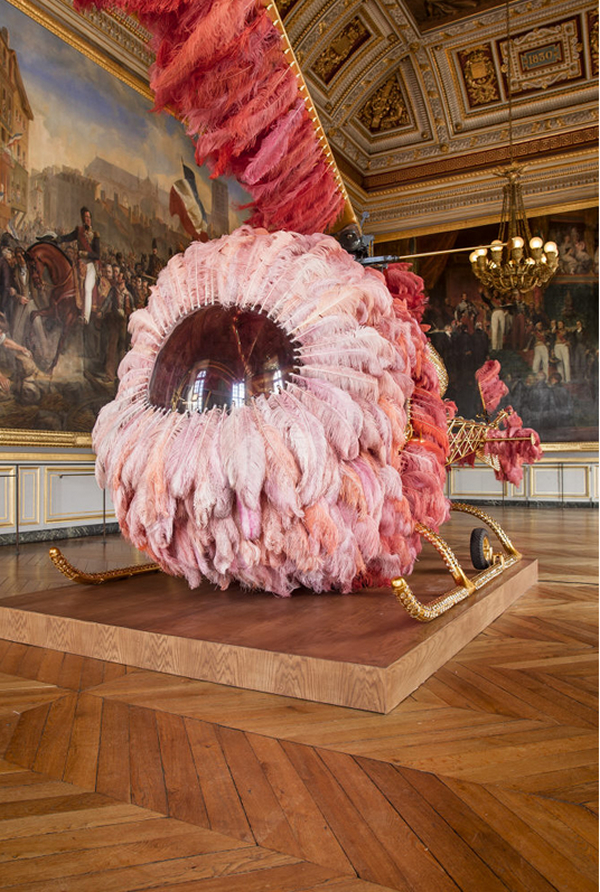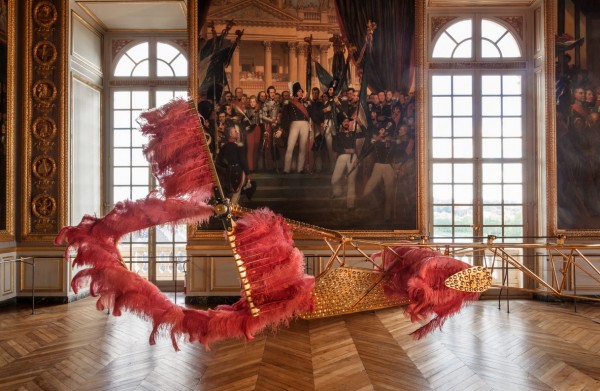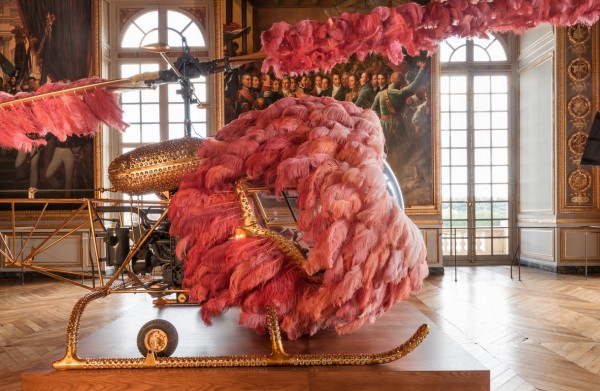- Poll Positions
![]()
- Septic Team 6 in Zero Dark Dirty
![]()
- Cold Shower
![]()
- Obama Universal Preschool
![]()
- The Meteor
![]()
- Oscar for gas prices
![]()
- Sequestration
![]()
- Some Oscar nominees
![]()
- Raise Your Hands
![]()
- TROUBLE AT THE VATICAN
![]()
- captain Berlusconi
![]()
- LOCAL NC Medicaid and unemployment cuts
![]()
- Wall Nuts
![]()
- Drones
![]()
- Boeing Outsourcing
![]()
- tax avoidance
![]()
- taxfree multinationals
![]()
- Obama Not Transparent
![]()
- Hammering
![]()
Political Cartoons 2013/02/19
Hopes Fade For Full Democracy
A pro-Beijing politician is pessimistic about plans for universal suffrage in Hong Kong.

A protester holding a placard demanding universal suffrage at a rally in Hong Kong, Jan 1, 2013.
As Hong Kong moves closer to the day when it was promised direct elections for its legislature and the chief executive, political analysts in the former British colony are beginning to question whether Beijing will ever allow genuine democracy in the territory.
The city's Economic Journal newspaper on Monday quoted former Hong Kong delegate to China's parliament in Beijing, Wu Kangmin, as saying that Beijing was unlikely to allow the territory, which was promised a high degree of autonomy under the terms of its 1997 handover to China, full democracy.
Instead, the pro-Beijing Wu, a former representative to the National People's Congress, told the paper that Beijing was likely to "set the bar higher" for electoral candidates.
"Personally, I am not optimistic that we will be able to implement universal elections by 2017," Wu said.
The increasing tension over whether the move to full suffrage, which is provided for in Hong Kong's mini-constitution, has led many to believe that hope for full democracy is fading fast.
Liu Dawen, former editor of the Hong Kong-based political magazine Outpost, said Beijing had a habit of playing its cards close to the chest when it came to Hong Kong's political future.
"The central government lies," Liu said. "It is their habit to make big statements, but you can't rely on them."
"They will probably set the bar higher for candidates, setting conditions that are aimed at excluding the democratic camp, so they won't be able to get nominated," she said.
"I think that now is the time for Hong Kong people to speak out about this."
She said that in spite of promises made that Hong Kong would enjoy a high degree of autonomy under the "one country, two systems" agreement, Beijing had nonetheless interfered directly in the political life of the territory on a number of occasions.
"I think that this has given people an idea of just how sincere they are about one country, two systems," Liu said.
Last month, Hong Kong Uni! versity law professor Dai Yaoting wrote a commentary saying he had given up hope of direct elections in 2017, calling on citizens to occupy the central business district to call for democracy.
And Chen Jianmin of the Chinese University of Hong Kong said he would boycott further consultation exercises with Chinese officials on the topic.
Interference
Liu said Chinese officials had held off from interfering in Hong Kong's affairs for a few years following the handover, so as to avoid causing alarm.
"Now, even business associations from small Chinese towns feel free to interfere in Hong Kong's elections," she said.
She said Hong Kong citizens wouldn't be given democracy by Beijing.
"Any democracy or freedom has to be struggled for," she said. "If we just rely on their generosity, we definitely won't get it."
Tens of thousands of people took to the streets of Hong Kong on Jan. 1 to demand the resignation of embattled chief executive Leung Chun-ying and universal elections for his replacement.
Leung was narrowly selected for the chief executive job this year by a pro-Beijing committee, although Hong Kong has been promised full and direct elections of the chief executive and the legislature by 2020.
Under the terms of its 1997 handover to China, Hong Kong has been promised the continuation of existing freedoms of expression and association for 50 years.
But journalists and political analysts say that the ruling Chinese Communist Party has redoubled its ideological work efforts in the territory following mass demonstrations on July 1, 2003 against proposed anti-subversion legislation, which the government later abandoned.
Last year, proposals for patriotic education in the territory's schools were shelved after thousands of protesters camped outside government headquarters for several weeks, dressed in black and chanting for the withdrawal from the curriculum of what they called "brainwashing" propaganda from the Communist Party! .
Reported by Qiao Long for RFA's Mandarin service. Translated and written in English by Luisetta Mudie.
THETIBETANWRITINGSYSTEM: Is it user friendly enough for today?

Setback for Chinese Democracy: Why Protest Leader Admits He “Regrets” Taking Charge of Wukan

A man in Wukan rides past an announcement for a new construction project in June, 2012. (Remko Tanis/Flickr)
These words are not from dissidents, but Lin Zulian (commonly referred to by his former name, Lin Zuluan), who led the southern Chinese village of Wukan in a 2011 anti-government uprising and is now the town's democratically elected leader. That uprising, a grassroots response to the local government's selling off land without giving villagers proper compensation, has given way to what many have seen as a bold democratic experiment in Communist China. One of the goals of a democratic village government was to recover the land villagers had lost. But according to Dragon Television, Shanghai's provincial television station, Wukan is now facing serious difficulties.
A history of setbacks
Some of Wukan's problems are not news. In September, 2012, several Western media outlets revisited Wukan and reported on the slow progress of its democratic experiment. Then, areas of dissatisfaction included villagers' "expectations gap" between the promise of democracy and its messy reality, meddling by county-level governments, and suspicions that the whole enterprise was simply a political move by Wang Yang, the former Guangdong province Communist Party chief who was known to eye a seat on China's elite Politburo Standing Committee.
Additional obstacles have now begun to emerge. Wukan is dealing with a dearth of outside investment due to concerns over its political stability, a village leadership that lacks governing experience, and in-fighting within the village administration itself. As one villager told a reporter,"All of Wukan is dissatisfied. First, we villagers overthrew the corrupt officials, but the new administration has done nothing [to get land back]; they got nothing back and have not given us an answer…We'll take anything [at this point]."
Surveying unbought luxury residences whose bare porches had begun to sprout grass, reporter Jin Song concluded that "currently many investors do not dare to invest in Wukan…because there is still no consensus about whether to lease the recovered land or to transfer it, the village committee is unable to monetize it."
Meanwhile, infighting is worsening between elected village leaders and those activists left on the outside. According to Yang Semao, deputy director of the governing village committee, "The village committee only has seven people…, [but] there are dozens of influential activists and it's impossible for everyone to join the committee. Now they're going all out to attack, defame, and stymie us."
Lin feels the same way. He told a reporter, "Recently I have been under way too much pressure; some irrational villagers are making trouble in village committee." Lin accused them of "provoking and instigating" in order to "overthrow" the new committee. This has already affected committee members. Zhang Jiancheng, who was responsible for land resources and public security, resigned on January 29. Even Lin has felt compelled to to install cameras at home out of family safety concerns.
When asked whether he regretted leading the 2011 protest, Lin said, "I think I do regret it now. My personal interests were not at stake in that protest, and neither are they now. Why should I have gotten involved? … Why did I go looking for trouble?"
Besides the in-fighting, the committee is also facing confusion about how to translate wishes for villager autonomy into real terms. As Zhang said, "Our democracy is still in its infancy … For example, when our Villagers' Oversight Committee was first established, no one knew how much power it had and it was always having conflicts with our village Party branch and village committee." Lin appeared to be on the verge of giving up, saying he looks forward to having a young and capable leader take over.
The importance of central power
Since its February 13 posting on the official Sina Video Account and on Sina Weibo, China's Twitter, this video has caused wide discussion on the Chinese Web. While a minority—mostly apparent Maoists—have argued that democracy is simply wrong, a plurality of comments call for time and patience, stressing that more permanent and systemic changes will be necessary before Wukan's fragile democratic experiment can succeed. To them, Wukan's hardship is neither accidental nor surprising, but instead a reflection of deeper problems rooted in Chinese political practices and the ambiguous and subtle relationship between grassroots initiatives and top-down policies.

A man reads a public announcement from the town government on the process of getting land back that was illegally sold by the previous local government of Wukan. (Remko Tanis/Flickr)
User @复旦陈云, an associate Professor of School of International Relations and Public Affairs at Fudan University, commented: "After the [1978] Xiaogangcun incident [where a village in Anhui province secretly experimented with ending China's disastrous collective land policy], the Third Plenary Session of the 11th Party Central Committee gave it validation and promotion. However, after the Wukan protest, there was no related …promotion, and this is the source of Wukan's isolation problem. "
Such comments are not mere Communist boilerplate. In the recent history of Chinese political reform, almost all successful bottom-up efforts enjoyed final approval from the central government. As Prof. Chen pointed out, Xiaogangcun began as a dangerous experiment, but was ultimately promoted as a model nationwide. This incident is seen as the beginning of China's decades' long policy of Reform and Opening. But the stars had aligned for Xiaogangcun; in the 1970s, central authorities were eager to reform the Chinese economy and move past the disasters of the Cultural Revolution. Moreover, the reform was economic in nature and did not threat the dominant position and leadership of the Communist Party.
Wukan is a bit different. As @清溪渔夫 commented: "The trouble facing Wukan is that it is a political experiment, which the government seemingly compromises [on] but secretly opposes." @小木a加个V吧 noted that political reforms must proceed differently: "The differences between Wukan and Xiaogangcun is this: economic reform is bottom-up, while political reform is top-down."
Politics, or business?
But the political and economic eventually converge. While the Wukan protest two years ago ignited hope and debate both home and abroad about Chinese democracy, the fever, at least in Wukan, appears to have cooled. Both villagers and netizens are focusing on more practical issues – investment and property rights.
Some doubt whether democracy was ever the core issue. @吕新雨12, a professor of journalism at Fudan University, wrote: "Wukan's true problem is the capitalization of rural land, but media hyped it as a democracy question and ignored the real issue. The village committee does not have the ability to solve this problem. The development of urbanization is the root cause. And that is why such land conflicts are so intensive in Guangdong."
The combination of business and political power has long been a common way of doing business in China. Wukan, already freighted with symbolic baggage, is trying to become an exception to this rule. Both politicians and businesses as yet unaccustomed to this new model.
Weibo user @胡说习惯 praised the spirit of Wukan's reforms, but ultimately concluded: "It's hard to make [the Wukan reforms] long-lasting. The investment environment has been damaged, which means the market is not in favor of this small scale political climate. Capital is always chasing power, and democratic election weaken this power."
Viewed from this perspective, elections and democracy are not a singular solution, but a tool. User @玻璃罐子里的苍蝇 echoed this view, writing, "What Wukan villagers really want is money. Using democracy to solve the Wukan problem sounds great, but actually it is not the right prescription … Wukan's follow-ups are reflections of the embarrassing situation of democracy in China. Democracy is still a luxury for us, just someone's talking point. "
Latest Updates - China Social Political News & Blogs
Categorized Updates :: Links | Blogs | News | Videos
- LINKS
- Links » China 精文 Crème
- Links » China 优文 Cream
- BLOGS
- Blogs » Politically Speaking
- Blogs » Socially Speaking
- NEWS
- News » Politically Speaking
- News » Socially Speaking
- News » Global Media
- News » China Media
- VIDEOS
- Videos » Politically Speaking
- Videos » Socially Speaking
- Videos » Global Media
- Videos » China Media
- MASHUPS
- News Mashup
- Blogs Mashup
Chinese Farms Breed Antibiotic-Resistant Bacteria
Overconsumption among humans is not the only problem, however. Among the various side effects of China’s surging meat consumption is the large-scale adoption of American-style intensive farming techniques, including routine preventative dosing of animals. A paper published last week by researchers at the Chinese Academy of Science and Michigan State University documents the consequent proliferation of drug-resistant bacteria at three large pig farms around China. From Maryn McKenna at Wired:
If you’ve followed news about food in China (at this blog or elsewhere), you’ll have seen that regulation of food safety is failing under the twin pressures of needing to produce a lot of protein and wanting to make a lot of money. (I think of food in China as being where the United States was before Upton Sinclair came along.) This lack of regulation is as true for agricultural antibiotic use as it is for other aspects of food production. China is both the largest producer and the largest consumer of antibiotics in the world, and it is putting almost half of its annual production intoagriculture: about 96 million kilograms, which by my math (using the newest ADUFA numbers in my last post) works out to about 7 times what the US is using each year.Overuse of antibiotics in agriculture is still a major problem in the United States, where 80% of all antibiotics sold are consumed by farm animals and the industry has fought beak and trotter to resist regulation. In a New York Times report last September, Sabrina Tavernise summed up the stakes:
[…] To quote from the paper: “The diverse set of resistance genes detected potentially confer resistance to all major classes of antibiotics, including antibiotics critically important for human medicine.”
[…] Their summation:The diversity and abundance of (antibiotic resistance genes) reported in this study is alarming and clearly indicates that unmonitored use of antibiotics and metals on swine farms has expanded the diversity and abundance of the antibiotic resistance reservoir in the farm environment. The coenrichment of ARGs and transposases further exacerbates the risks of transfer of ARGs from livestock animals to human-associated bacteria, and then spread among human populations.
Antibiotics are considered the crown jewels of modern medicine. They have transformed health by stopping infections since they went into broad use after World War II. But many scientists say that their effectiveness is being eroded by indiscriminate use, both to treat infections in people and to encourage growth in chickens, turkeys, cows and pigs.See further discussion of “the doomsday scenario of a world without antibiotics” at the Bulletin of the World Health Organization in 2010, and a Telegraph report on antibiotic overuse in China and its dangers from the same year.
Whatever the cause, resistant bacteria pose significant public health risks. Routine infections once treated with penicillin pills now require hospitalizations and intravenous drip antibiotics, said Cecilia Di Pentima, director of clinical services at the Infectious Diseases Division at Vanderbilt University’s Department of Pediatrics. Infections from such strains of bacteria are believed to cause thousands of deaths a year.
“The single biggest problem we face in infectious disease today is the rapid growth of resistance to antibiotics,” said Glenn Morris, director of the Emerging Pathogens Institute at the University of Florida. “Human use contributes to that, but use in animals clearly has a part too.”
Last month, Shanghai-based researchers shed new light on one process by which bacteria develop resistance. From Alice Yan at South China Morning Post:
Now researchers at Fudan University’s Shanghai Medical College say they have uncovered an important mechanism leading to resistance. The team, led by Professor Alastair Murchie, a British molecular biologist, said in a paper in the peer-reviewed journal Cell last week, that they had found a special section of ribonucleic acid (RNA) in some infectious bacteria that could make antibiotics useless.
[…] Murchie said that while aminoglycoside antibiotics accounted for only about 20 per cent of all antibiotics, the research was important because drug resistance remained a significant threat due to the way it evolved and emerged.
“It’s important that we understand the underlying mechanism [of] why resistance happens, how are the bacteria so flexible and why do they respond so well to treatment by antibiotics?” Murchie said.
© Samuel Wade for China Digital Times (CDT), 2013
---------- Forwarded message ----------
Toadfish
http://en.wikipedia.org/wiki/Oyster_toadfish

Davos 2013 - (CNN) Emerging Economies at a Crossroads
Emerging Economies at a Crossroads Despite persistent global economic turmoil, how can growth be reignited in emerging economies? This session was developed in partnership with CNN International. • Carlos Ghosn, Chairman and Chief Executive Officer, Renault-Nissan Alliance, France; World Economic Forum Foundation Board Member • Muhtar A. Kent, Chairman of the Board and Chief Executive Officer, The Coca-Cola Company, USA; Co-Chair of the World Economic Forum Annual Meeting 2013 • Sanusi Lamido Sanusi, Governor of the Central Bank of Nigeria • Alexandre Tombini, Governor of the Central Bank of Brazil • Luis Videgaray Caso, Secretary of Finance and Public Credit of Mexico • Yi Gang, Deputy Governor, People's Bank of China, People's Republic of China Moderated by • John K. Defterios, Anchor and Emerging Markets Editor, CNN International, United Arab Emirates; Global Agenda Council on the Arab World www.weforum.org | From: WorldEconomicForum Views: 1      0 ratings | |
| Time: 01:01:15 |
Political Cartoons 2013/02/19
Teng Biao: Defense in the Second Trial of Xia Junfeng Case
Xia Junfeng (夏俊峰) was a street vendor from Tieling county, Liaoning province (沈阳铁岭县). On May 16, 2009, while selling chicken strips, roasted sausages and other snacks with his wife Zhang Jing near a crossroads in Chenhe District, in the city of Shenyang (沈阳沉河区), Xia Junfeng was seized by urban enforcers known as Chengguan (城管) and taken to their office where he was beaten. During the course of the beating, Xia Junfeng fought back with a small knife he carried in his pocket, stabbing two Chengguans to death and injuring one. He was convicted of intentional homicide and sentenced to death during the first trial, and the second trial, held in July, 2010, upheld the verdict of the first trial. The case has garnered wide online attention in China since its onset. It is currently being reviewed by the Supreme Court in Beijing. Dr. Teng Biao was Xia's defense lawyer in the second trial, and the following is an excerpt of his closing argument. Several volunteer translators, Yaxue included, have collaborated on a complete translation of Dr. Teng's defense in the hope to shed light on, and call for attention to, the Xia Junfeng case and the ill system at its root. The Chinese original is here.
Since the Chengguan system was established in 1997, its drawbacks have been clear. The crimes it has committed have been many and have bred bitter resentment among the population. To date, there is no national "Urban Administration Law" or administrative statutes to govern it, and Chengguan "enforcement" has never had any legal basis. Nor has there been any consistency or standards in its enforcement approach as well as its leadership structure. It has had no legal oversight but still acts as law enforcement. Its members have no clear legal definition. Their personal qualities are as varied as to have thugs and hooligans in their midst. In many cases, they rob, and work for personal gain by harassing and harming citizens at will under the name of enforcement.
In this system of vague legal status and inadequate oversight, Chengguan's violent habit becomes a necessity, and a part of the system. Extralegal violence, thus employed to compensate for inadequate regulation and an absence of authority and legal deterrence, is no longer individual behavior. Such violence exists everywhere with the permission of the authorities. It is needed because of an overriding concern for "city image" and "urban management." Finally, when extralegal violence is not monitored by the people and the media, and not punished by the law, it is only natural for Chengguan members to feel justified. Using violence with impunity enables the Chengguans to see violence psychologically as their "privilege," a sign of status and pride. Since the legal and political status of Chengguan is unclear, it is only natural for its members to seek personal gain, vent their anger, and prey on the citizens they were intended to protect. Once violence starts, it has its own momentum, and, with a specific system enabling it and Groupthink encouraging it, it eventually becomes a habit and an addiction.
I believe Zhang Xudong and Shen Kan would have never displayed their cruelty and gratuitous violence toward their wives and children, because in a family environment they adhered to the principles of love and decency. But in the milieu of the Chengguan's collective enforcement, they were overtaken by the desire and passion to inflict violence. Although, for Xia Junfeng's interest and for the sake of the case reaching a just decision, I as the defense lawyer must point out that Shen Kai and Zhang Xudong's actions at the time broke the law. Still, I don't just blame them. They were my countrymen, living in the same imperfect world as the rest of us. They were no doubt victims of the Chenguan system as well. I hold deep empathy toward them, and can feel their family's loss and pain, which are also the misfortune of all society.
In this case, the Chenguan system has already destroyed two families; do we have to destroy a third one? We have lost Shen Kai and Zhang Xudong. Several dozen citizens have been beaten to death by Chengguans. We have already paid a heavy price for the brutal Chengguan system, and now, do we have to sacrifice justice in order to endorse an ill-conceived system and the brutality committed by its members? Must we make the judiciary an avenging hand that puts Xia Junfeng, a husband and father of a nine-year-old, to death?
Chief judge and judges,
In the worldwide trend against the death penalty, most countries have abolished it by law or in practice, and in the countries where it is still in use, it is reserved for the most egregiously violent crimes. It's bad enough that we have been applying the death penalty in economic or non-violent criminal cases, are we now going to apply it in cases of excessive self-defense or justifiable self-defense as well? Cao Haixin was executed for self-defense, and the tragedy is a shame in the judicial history in Henan. Today, in the 21st century, are we going to repeat the same tragedy in Liaoning?
The death of two citizens is a tragedy for our society, but if Xia Junfeng were to be sentenced to death, it would be an obvious and gargantuan mistake, a tragedy unbearable and unacceptable to society that will cast a shadow on the Chinese judiciary for a long time to come. If Xia Junfeng were to be sentenced to death, many more innocent, helpless vendors will die at the hands of Chengguans. If one were to be sentenced to death for self-defense, he or she would be inclined to kill excessively and kill many more without qualms, because one can only die once. If one were to be sentenced to death for self-defense, there would be no boundaries between guilt and innocence, good and bad, life and death; and the power of the rule of law, already pathetically weak in our society, would be destroyed altogether by evil, chaos and brutality.
Without exaggeration, sentencing to death a citizen who was only defending himself will have disastrous repercussions for the whole society since it would embolden the attackers and intimidate those who resist unlawful violence. While evil-doers are encouraged, victims will be harmed the second time by the court after sustaining harm first from violent crimes. The act of self-defense in the face of unlawful harm is not only a virtue but an instinct. But instead of being protected and praised, if such an act is condemned with a sentence of death, then today's verdict will hurt not only Xia Junfeng's legal rights, but also the dignity of the law itself, social ethics, and the citizens' sense of right and wrong.
It is my hope that the court's decision today will indicate that our judiciary system is still able to uphold the basic sense of right and wrong and some degree of independence. It is our hope that the judiciary process of Xia Junfeng's case will show the world that the long-suffering Chinese people can draw lessons from their miseries and stand firm on the side of the rule of law and humanitarianism.
Filed under: Human Rights & Civil Rights Movement, Rule of Law Tagged: chengguan, death penalty, Shen Kai, Shenyang, Teng Biao, urban administration, urban management, Xia Junfeng, Zhang Jing, Zhang Xudong

PBS: wide angle: China Prep (Part 1 of 4)

China’s Most Influential Micro-Blogger Banned for Criticizing Communist-Friendly Search Engine

Advice for Jike users: Don't search for "Dalai Lama" or "separation of powers." (David Wertime/Tea Leaf Nation)
On February 17, ex-Google China head Lee Kai-fu stated on Twitter that he had been locked out of China's Twitter-like Sina Weibo for three days, ostensibly for criticizing a Party-backed search engine called Jike and its sporting celebrity director Deng Yaping.
Lee, who is currently head of Chinese venture capital firm Innovation Works, is an avid microblogger who often tweets in support of independent media and freedom of information. He has over 30 million followers on Weibo, who recently dubbed Lee the most influential microblogger of 2012.
Lee is no stranger to controversy–over the past six months, more than 78 of his posts have been deleted by Sina Weibo–however, this is the first time that he has been blocked entirely.
His Weibo account was frozen on February 17 after he criticized Communist Party-sponsored Internet search engine Jike and its Party-appointed director Deng Yaping, a former Ping Pong champion who is regarded as one of the best players of all time. Following unconfirmed reports that Jike spent an alleged 2 billion RMB (about US$ 320 million) of taxpayer's money without turning a profit, and that Deng was subsequently forced by an irate superior to cut 100 staff, Lee blogged that while he declined to comment on such gossip, he had some questions:
1) Why is it necessary to use taxpayers money to create a search engine? 2) Is there any hope for a search engine that is developed without a commitment to the open sharing of information? 3) Why would the CEO of a search engine be appointed by the Party? 4) If America's Democratic Party had appointed Phelps as Google's CEO, would it have been able to defeat Yahoo and become the world's largest search engine?
Lee's comparison of Deng Yaping to swimmer Michael Phelps may have been a little unfair; in addition to being a ping pong icon, Deng has a Ph.D in Land Economy from Cambridge University's Jesus campus, where she researched the effect of the 2008 Olympics on China's development. She has also served on the Olympic Committee's Ethics and Athletes commissions and is a member of China's CPPCC, a political advisory body to the Chinese government.
However, the search engine that Deng commandeers, Jike, certainly has not been doing well. A recent report from Chinese IT statistics platform CNZZ indicates that among China's domestic search engines, Jike is used by approximately 0% of Web users, with less than 1/10,000 of total market share. According to a recent China Media Project article, Jike's search results of controversial issues lean heavily towards the Party line, omitting alternate viewpoints on topics such as Nobel Prize-winning dissident Liu Xiabo and the separation of government powers.
The "gossip" that Lee Kaifu refused to comment on in his post was an article, since removed from the Internet, that contained accounts allegedly from a Jike employee stating that Deng Yaping did not understand the search engine industry. After being appointed, the article alleged that Deng "blindly" expanded her employee base, spending over 2 billion RMB on staff and equipment until forced to downsize after failing to turn a profit. She also allegedly enjoyed regaling staff during meetings with tales of her ping pong exploits. The article quoted her telling employees, "You all are good for nothing. Back when I was playing ping pong, I was always #1 and don't even know how far behind #2 was–you guys can't learn from Baidu, you have to emulate Google."
This critique of Jike and boss Deng was by no means Lee Kaifu's first controversial microblog posting. Lee was one of many high-profile microblogging celebrities that tweeted in defense of Chinese publication Southern Weekend after its New Year's greeting was axed by censorship authorities in January. He also stated last September in a speech at a World Economic Forum conference held in Tianjin that social media is a way for China to deal with its corruption issue.
After being blocked from Weibo, Lee reverted to Twitter, where he has about one million followers, tweeting, "I've been blocked from Weibo for three days, [but] everyone can find me here." In a subsequent tweet, he cited Xi Jinping's statement earlier this year that the Party must accept "sharp criticism" from non-communists.
Online reaction to Lee's involuntary hiatus from the Chinese blogosphere appears subdued; many appear unaware that he has been blocked, as his name and profile can still be searched.
User @YongquanH asked, "He got blocked for saying some unknown search engine was wasting money? Is one limited to singing praises?"
One reason for this muted response may be that few Chinese Web users are aware of Jike's existence; many of the 2,000 Web users that responded to a January 18 report about Jike's miniscule share of China's search engine market commented that they had never heard of the site. Others said that they had never used it. Some wondered what Deng had done with the billions of RMB allegedly invested in the Jike venture. User @鸟宿池中树 wrote, "Just because you're good at ping pong, it doesn't mean you're good at everything. Do you think you're Superman?"
To be fair, perhaps more blame lies with those who appointed Deng to a position for which she may have been simply unqualified.
Latest Updates - China Social Political News & Blogs
Categorized Updates :: Links | Blogs | News | Videos
- LINKS
- Links » China 精文 Crème
- Links » China 优文 Cream
- BLOGS
- Blogs » Politically Speaking
- Blogs » Socially Speaking
- NEWS
- News » Politically Speaking
- News » Socially Speaking
- News » Global Media
- News » China Media
- VIDEOS
- Videos » Politically Speaking
- Videos » Socially Speaking
- Videos » Global Media
- Videos » China Media
- MASHUPS
- News Mashup
- Blogs Mashup
Trailer, BB's/Leatitia's entrance : Serge Gainsbourg (english subs)

[Starting] the Yunnan Wenshan iron thugs break Zhuang village thwarted raid public security ignore (16 Figure)
Working With China. A Seminar For In-House Counsel.
On February 20 at 2:00 Eastern, I will be co-presenting a Doing Business in China webinar along with Andrea Charters, Vice President and Associate General Counsel of Rosetta Stone Inc. This webinar is being sponsored by LexisNexis and, incredibly enough, it is entirely free.
We will be gearing our presentations towards in house counsel and together we will be addressing the following issues, with a view towards protecting IP:
- Choosing a Chinese partner
- Identifying what you need to protect
- Structuring your deal or contract
- Writing an arbitration clause
- Understanding the China International & Arbitration Trade Commission
- Executing key elements in employee contracts
- IP registrations: trademarks, patents, copyrights and licensing agreements
Click here for more information and to sign up.
China Gets Serious About Diagnosing Online Game Addiction. I Am Not Making This Up.
Anyway, I kind of thought that after the online game industry came into its own a few years ago, parents and government officials would learn to deal with it, let the kiddies play games, and live with the consequences.
Apparently I was wrong:
China's online gaming industry took in revenue worth 24.84 billion yuan (4 billion US dollars) in the first half of 2012. However, minors' addiction to online gaming has caused serious social problems, which sometimes lead to juvenile crimes, according to an anonymous official with the Ministry of Culture.Anonymous official — nice. You'd think if these social problems and juvenile crimes were rampant, Xinhua might have been able to get someone on the record, eh? On the other hand, if this is all bullshit, then the sourcing makes more sense.
You gotta love these fantasy social problems. All one has to do is find one or two anecdotes (e.g., kid somewhere plays games for 72 hours straight and drops dead of dehydration) of kids behaving badly, then cleverly suggest that this sort of thing is endemic in modern Chinese society. If you're already predisposed to thinking that kids these days are worthless and lazy, you'll probably buy into the whole thing.
And then of course, once conventional wisdom says that there is such a thing as online game addiction, and folks start profiting from the "cure," there's no stopping any of it. This includes the health care establishment, which then has to make sure that diagnosis and treatment are being done properly. No, I'm serious.
China's culture and Internet authorities have decided to develop China-specific criteria for diagnosing minors' addiction to online gaming.Starting to understand how this stuff gains momentum? I'd be laughing my ass off if I wasn't so worried about the poor kids who are going to be subjected to online game addiction "treatment" under these new protocols. We've already heard about a few infamous cases of kids being thrown into institutions — some of these children have been seriously damaged on their way to a "cure."
If cases are assessed based on imported criteria developed for groups with different cultural and social backgrounds, it could result in misdiagnosis, according to a special workplan jointly issued by 15 ministry-level authorities on Sunday.
The plan calls on researchers to develop tools to identify the early stages of potential addiction, so as to enable early intervention for minors.
Apparently a sufficient number of professionals have bought into the whole online game addiction mythology that they can now push the idea that treatment must be localized for Chinese kids. In the absence of high-quality diagnostic tools, the danger is . . . wait for it . . . misdiagnosis!
The jokes write themselves. I just wish more people realized this isn't a serious medical condition. Can't parents just turn off their kids' laptops and tell 'em to finish their homework before getting back online? How difficult is that, anyway?
© Stan for China Hearsay, 2013
Nearly a year after the U.S. Securities and Exchange Commission began an investigation into the business practices of Hollywood film companies in China, The New York Times reports that the government has neither announced any action nor given any indication about the scope of its ongoing inquiry:
Some who are involved in Hollywood's entry into China are privately expressing hope that the Justice Department inquiry will be resolved before they run out of time on what one of them last week called a "ticking clock," as Chinese consumers outgrow their receptivity to Hollywood fare.
The squeeze started last year when they began to spend more money on some homegrown films than on the American blockbusters.
But Michael W. Emmick, who was formerly a prosecutor with the Justice Department, and now focuses on the corrupt practices cases, among other things, in his private law practice, said a resolution could be a long time coming.
"This is still early in the game," he said.
While Mr. Emmick is not representing clients in the investigation, and said he had no direct knowledge of it, he said that regulators sometimes use such industrywide inquiries as a "cost effective" way of putting an entire business sector — like the pharmaceuticals industry or the portion of the financial industry dealing in sovereign debt — on notice.
© Scott Greene for China Digital Times (CDT), 2013.
"The water has been gone completely in the past two days," she wrote. "Grandma has been ill for days. I can't expect her to get the water."
Like many of estimated 85 million other "left behind children," the young Guizhou Province student too often misses school to assume the responsibilities of an adult, while her parents live and work in a city far from home. This is the one of the prices of the Chinese regime’s economic growth model, which has brought astounding GDP statistics, but more than 30 years of fractured families and emotionally wounded children.
Struggling to support their families, millions of rural parents leave their villages to seek work in factories in the cities. Their children are left at home with their elderly grandparents, or other relatives, or even alone. The care of the children is often limited to basic living support and safety, while education, behavior, and psychological needs are often neglected.
“I could not help crying whenever I thought that when the bus arrives, my father will leave.” — Yang Haijiao
Because of their low income and the strict household registration system in China, which makes it difficult for children to attend school anywhere but in their hometowns, most migrant workers' children cannot go with their parents, reports Deutche Welle. There are few local boarding schools for these children, and few schools for migrants' children in the cities.In Their Words
“The Diary of Chinese Left-behind Children,” a collection of reflections written by 26 children from southwestern China’s Guizhou Province, documents the plight of these children in their own words. Their teacher, Yang Yuansong, compiled and edited the narratives, which describe what statistics and studies could never convey.Burdened with the responsibilities of an adult, Yang Haijiao missed school every other day to take care of her grandmother, or the family farm. "The weather is terrible. The drought has lasted for too long. If it rained, we'd have water and I would not have to miss school. I really don't want to continue missing school!"
When it did finally rain, she had to plant corn.
The overwhelming responsibilities are accompanied by the sorrow of separation. Yang Haijiao writes of the misery she felt at seeing her father leave: "I could not help crying whenever I thought that when the bus arrives, my father will leave and we will be left with many chores at home, and we won't know when he'll be back."
When her father asked why she was crying, she didn’t respond. He reminded her to "study hard." Yang writes: "I kept crying until father got on the bus."
Another student, Xia Min, wrote of Xia Congli, her classmate who was left alone at home, "One day on the way to school, Xia Congli told me her mom and dad are leaving to work at a far away place and she started to cry. I told her not to feel bad and said her parents must have felt sorry, too."
The note continued: "We often played games with her when we went to her house and hoped she would forget about the sad things. But she can not. She is still feeling as sad as before. I feel so bad."
Psychological Problems
The daily pressure of this bitter life has left many children with psychological problems. According to a survey by Women of China, 57 percent of high school age left-behind children suffered from mental health problems. The longer their parents have stayed away from home, the more serious were the psychological problems the children developed.The survey showed that most of the left-behind children are prone to psychological problems because of the lack of affection or family supervision and guidance. They become weak, introverted and exhibit low self-esteem. The separation from their parents often caused resentment and loneliness.
Learning disabilities are common in left-behind children. Frequent school absences and little, if any, help with homework coupled with the emotional trauma of the fractured family have left these children with few resources for gaining a proper education. The survey by the All China Women’s Federation reported that 45 percent of grandparents had never attended school, and 50 percent only had a primary education, and could not be expected to help the children with their schoolwork.
The left-behind children of Youji village of Guangxi are boarded at a primary school. School principal Lu Lipeng explained to Deutsche Welle: “The responsibility is immense. Their parents have all left for work and left their children at the school. Being a principal, their personal safety is my number one priority. Secondly, it is their room and board. They must be cared for like my own kids.”
Other left-behind children are not so fortunate, and must face difficult and even dangerous situations alone. Some of these vulnerable children even lose their lives. A 2005 flood in Hetang County, Hunan province killed 12 children, eleven of whom had been left behind.
Latest Updates - China Social Political News & Blogs
China’s Disappointing Absence from U.N. Water Summit
After recent heated debate over China's mega-dam plans, any visitor to the launch on February 11 of the U.N.'s much-vaunted International Year of Water Cooperation would have been disappointed.
As well as a notable absence of any representatives from China, there was a lack of any discussion of large infrastructure projects, just weeks after the country announced plans to build a slew of controversial giant dams on rivers flowing to other countries, including India.
The positive mantra of cooperation, cited by diplomats, technocrats, scientists, and policymakers gathered at UNESCO's headquarters, side-stepped the more intractable factors that lie at the heart of water conflicts: neglect of treaties, powerful political and business interests, and asymmetrical power relations between countries that share river basins.
Participants highlighted impressive cases of collaboration—from clearing up pollution along the Danube, to economic cooperation on the Nile; from joint management of water tables in Africa, to city-to-city collaboration on water sanitation and flood control.
A recent study on water cooperation and conflict from 1945 to 2008 was cited to prove conventional wisdom on "water wars" wrong. Researchers at Oregon State University compiled a database for every reported water interaction between states and found that there were more than twice as many cooperative events than conflicts between riparian countries.
But the same research also shows that 90 percent of conflict-laden events related to just two issues (infrastructure and quantity)—the very gripes that keep China's neighbors awake at night. And when there are no existing legal frameworks for cooperation or mechanisms to share data across river basins—like between China and other Asian countries—these are tricky issues to tackle.
"Political will is the crucial aspect we need to work on in the water world," warned Johannes Cullman, chairperson of the International Hydrological Programme. "Without the political will, we can have lots of nice discussion and councils, we can have lots of nice programmes on paper, but we will not change the way the people live in our world in terms of scarce and contaminated resources."
The U.N. can be congratulated for pushing the importance of water cooperation up the agenda, but the right parties need to be brought together for discussion around the same table.
Categorized Updates :: Links | Blogs | News | Videos
- LINKS
- Links » China 精文 Crème
- Links » China 优文 Cream
- BLOGS
- Blogs » Politically Speaking
- Blogs » Socially Speaking
- NEWS
- News » Politically Speaking
- News » Socially Speaking
- News » Global Media
- News » China Media
- VIDEOS
- Videos » Politically Speaking
- Videos » Socially Speaking
- Videos » Global Media
- Videos » China Media
- MASHUPS
- News Mashup
- Blogs Mashup
Bootleg: Sansumg GALXAY SIII by Suvnsmg
Yes, it is Sansumg Galxay SIII.
(Made by Suvnsmg aka Win More Company @ Suvnsmg.com)
|
Luxuriously Yours 2013/02/19
Concept Superyacht, The Xhibitionist by Gray Design is Quite The Looker
Eduard Gray of Gray Design, a Swedish company has brought out an incredible concept superyacht christened Xhibitionist. Much like the company’s tagline, ‘Redefining Tradition’, their designs take on traditional designs and take them to a whole new level, adding to it their creativity and ingenuity. This luxury yacht could definitely give the existing celebrity yachts in the market, a run for their money. This noted designer is the brain behind other well known designs like the Superyacht Sovereign, the Dartz Prombron Nagle among others. The Xhibitionist is a worthy addiction to the evergrowing list of amazing concept yachts like Sunreef 82’ designs.
The inverted triman configuration has been used for a remarkable looking hull, whose design also gives it additional stability. This luxury yacht concept is reminiscent of luxury cars, a specialty of Eduard Gray. An interesting feature is that the engines are placed behind glass walls, which allows for easy visibility and access for maintenance purposes. It has a huge beach club area for entertainment purposes. The fly deck can also be used for this purpose. The beach club area is also fitted with a Jacuzzi for the guests to relax in and soak up some sun.![concept_superyacht_xhibitionist_by_gray_design]()
![concept_superyacht_xhibitionist_by_gray_design_interior]()
![concept_superyacht_xhibitionist_by_gray_design2]()
The space at the front of the yacht that you see, which has helicopters on it are actually solar panels, which are strong enough to act as a helipad or a party stage, whatever be your need. They also perform their usual job of powering the yacht. The interiors are huge and look as sleek and beautiful as any high end house. The ‘Retail Mode’ brings in partitions in the design to allow for a more privacy. The Vision System’s Nuance smart shading feature is another privacy enhancing feature. It has been described as a blend of style, purpose and efficiency, and it truly is all that.A serious rival to the mighty iPhone
The iPhone is the market leader for smartphones across the world and it is easy to see why. Apple gave us so much more than a phone, they set such a high benchmark it has been the phone of choice for some years.
Lussorian have much love for the iPhone, so finding a rival to the iPhone means big things. It would take a lot to sway us.
With the new Motorola RAZR i (in the delectable white) has us swaying all over the place.
To beat the iPhone, the following factors need to be considered. Aesthetics, Usabilty, speed and price. The new RAZR ticks each box.![image]()
The phone has many key features and is even coated in the same Kevlar fibre used to make bullet proof vests, so yes it is a tough cookie. What makes this even more remarkable is the sleekness of the phone. We are
not sure how Motorola have managed to pack everything into a unit so slim.
The screen is edge to edge stuff, all 4.3 inches using Corning® Gorilla® Glass display, making it highly damage resistant. The Razr i even comes with a splash-guard coating - both inside and out for water resistance, not to mention dust and weather sealing.
The seriously long-lasting 2000mAh battery (20 hours of battery performance from a single charge) and the power and speed of Intel Inside® also add to the appeal.
Powered by Android™ 4.0, Ice Cream Sandwich (upgradeable to Jelly Bean) making this a really effective Google portal. The speed of the phone online is better than the current iPhone. Impressive stuff.
The Razr i also features an instant launch 8MP camera with multi-shot mode that lets you take up to 10 pictures in less than a second.
The Motorola RAZR i is one of the best, if not the best, smartphone we have trialled. To blend looks with performance balanced against a great price is truly commendable. If you are looking for a new smartphone, I urge you to consider the new RAZR!
Motorola RAZR™ i White is now available in white exclusively from Phones 4U, and on wider availability with selected mobile phone retailers. More information on the RAZR i is available from razri.com.- Hublot Oceanographic 4000 Jeans unveiled
![]()
Dive to the deepest of oceans in Hublot's newly launched – "Oceanographic 4000 Jeans". Brainchild to Tina Zegg and Carlo Cerlati, the 'Diver 4000′ has been created by Hublot in collaboration with Zegg&Cerlati. It's an ultra-modern version with pressure resistance measured at 4000m depth. Christened, the first ever ultra-technical diving watch with denim straps, the 'Oceanographic 4000 Jeans' sports Italian luxury denim, flaunting an uber cool, fashionable edge.
A limited edition of 21 watches, you would find the Hublot "Oceanographic 4000 Jeans" only in select stores: Zegg&Cerlati boutiques at Place du Casino, Monte-Carlo, Ischgl, Austria and Samnaun, Switzerland.![]()
![]()
![]()
![]()
![]()
![]()
![]()
![]()
[Hublot]next story » - Napoleon Bonaparte's engagement ring offered to his first wife Josephine goes on auctionHistorically, the world's greatest military leader and the celebrated first emperor of France, Napoléon Bonaparte who revolutionized military organization and training, sponsored Napoleonic Code, reorganized education and established the long-lived Concordat with the papacy, actually went on to marry a 6-years older widow with two children Joséphine de Beauharnais on 9th March 1796, just days after proposing and announcing their engagement. Notably, the marriage was not well received by Napoleon's family who were actually shocked that he had married an older window, and eventually ended up in a divorce in 1810, as Joséphine didn't bear Napoleon any children. However, the widow of French aristocrat Alexandre de Beauharnais, Joséphine was not just the recipient of numerous love letters written by Napoleon, but also of several price jewels, including a simple diamond and sapphire engagement ring that Bonaparte offered to his first wife. Now, that very same gold ring topped by two pear-shaped stones will cross the auction block of auctioneer Osenat at Fontainebleau, south of Paris, on March 24th, where it's expected to fetch as much as $16,000.Notably, despite being involved in numerous affairs, remarriage and then exile, the first French emperor never forgot her and his last word according to those near him on his death bed, were: "France. The army. The head of the army. Josephine."
![Napoleon Bonaparte's engagement ring offered to his first wife Josephine goes on auction]()
Napoleon Bonaparte's engagement ring offered to his first wife Josephine goes on auctionAlso, we have earlier seen the sale offering of Napoleon Bonaparte's rare letter written in English for $100,000 (pictured above), along with the little chair that this diminutive dictator is said to have sat on before his army was defeated at the battle of Waterloo went on auction, besides his lock of Napoleon's hair and a lithograph of his body soon after his death and his upper permanent canine tooth, fetched top bids in the auction.
Napoleon Bonaparte letter auction could fetch upto $100,000
Via: LiveAuctioneers - 2013 Cadillac CTS-V Coupe Silver Frost and Stealth Blue edition launched
![]()
After BMW launched the special edition BMW Frozen M3 coupe in matte finish, Cadillac is also introducing the dull finish with the limited edition matte finish CTS-V Coupe models. The new colors Silver Frost and Stealth blue will join Cadillac's palette this year. The first one, Silver Frost Edition CTS-V Coupe will have a unique silver matte paint, achieved by reducing the car's typical "80-gloss" clear coat to just "30-gloss. Though, the car will have an overall dull finish, the paint can display slight shine in right lighting conditions. A supercharged 6.2-liter V-8 engine, rated at 556 horsepower and 551 pound-feet of torque, powers the Silver Frost Edition CTS-V Coupe. Red or yellow Brembo brake calipers, as well as polished or satin graphite wheels can also be included in the car. Only 100 units of the limited edition Silver Frost CTS-V Coupe is offered by Cadillac.![]()
Cadillac features the next version, Stealth Blue Edition, with a blue-gray glossy finish and an optional Twilight blue leather to go with the paint. The Stealth blue paint will be offered the CTS coupe and all CTS-V models.![]()
Pricing details have yet to be released, but both models are expected to release in March.![]()
[Via - Motor-Authority] - de Grisogono Sugar watch unveiled
![]()
Indulge yourself to a Sugar treat from the Swiss house of luxury – de Grisogono. Paying homage to beauty and color, the prominent jeweler launches a watch collection exclusively for women in four alluring variations – white diamonds, emeralds, orange and blue sapphires. A sneak peek at the collection reveals that the watch sports the de Grisogono signature: colored mother-of-pearl dials and tone-on-tone stingray straps, all in all a sure shot breathe-taker. This sweet dazzling treat from de Grisogono is caked with diamonds all over – on the case, dial, clasp and also the back of the case.
Soaking in a luxurious spill of precious stones, Sugar is every bit an irresistible temptation that every woman would like wrapped on her wrists. Ladies make this elegant piece of luxury yours in just $142,000! Watch enthusiasts can drool at the debut of the de Grisogono Sugar watch. at the forthcoming Baselworld (April 25 to May 2.)![]()
![]()
![]()
![]()
![]()
![]()
[De-Grisogono Via Wwd] - Duet Lux is a 24k gold-plated vibrator with built-in data storage
![]()
In this month of love, add some pleasure to your life with the Duet Lux Vibrator. After creating the unique quite vibrator, Crave, the San Francisco based pleasure toys company has created the deluxe Duet Lux. It is the first vibrator, which is a perfect blend of quality, luxury design, and a USB memory drive. This 24k gold-plated base sex toy with a tactile and beautiful finish has four vibration modes and four power levels. Moreover, you can also personalize your Duet Lux Vibrator by engraving an erotic message or your initials on the gold plate. Though, we have seen a gold plated LELO's INEZ vibrator in the past, this one is the first ever that a vibrator comes with 16GB storage space for your intimate stuff.![]()
Created from the most touchable of materials, this is one of the quietest vibrators available in the market. The compact Duet Lux detaches and plugs into any standard USB port, where it will recharge fully in under two hours. It is completely waterproof when fully assembled, which makes it perfect bubble bath companion.![]()
The Duet Lux USB-powered vibrator comes in a classy genuine leather travel pouch, so that you can always take your pleasure companion along. The gilded Duet Lux vibrator is available for $349.![]()
![]()
![]()
![]()
[Lovecrave Via - Gizmodiva] - President John F. Kennedy's items fetched up to $2M at auction 50 years after his assassinationIn the year 2012, we have seen that the United State's first President George Washington's personal Constitution and Bill of Rights got sold for $9.8 million, more than 3-times the highest pre-sale estimate, the 1823 printing of the Declaration of Independence for $597,500, the Gilbert Stuart portrait of George Washington fetched $8.1 million at the Sotheby's auction, all of these sales are clear evidence that collectors are willing to pay top prices for the White House Presidential memorabilia, American historical memorabilia and the important items associated with America's most memorable presidents. And in an auction attended by roughly 400 people from across the U.S. and participated by a number of online bidders across the globe, thousands of items that belonged to longtime aide of President Kennedy got sold for as much as $2 million, thus further ensuring that avid collectors of Presidential memorabilia splash out huge amounts to expand their eclectic collections.
![President John F. Kennedy's items fetched up to $2M at auction 50 years after his assassination]()
President John F. Kennedy's items fetched up to $2M at auction 50 years after his assassinationNotably, at this auction that ended this Monday at John McInnis Auctioneers in Amesbury, nearly 50 years after President John F. Kennedy's assassination, a birthday car from his son, the late John F. Kennedy Jr., fetched $17,000, a flag on Kennedy's motorcade limousine sold for $55,000, while Kennedy's Air Force One bomber jacket got sold for $570,000, a price far greater than its pre-sale estimate of $40,000.![Air Force One Bomber Jacket]()
Air Force One Bomber JacketThe eclectic collection of President John F. Kennedy offered on sale included a number of photographs, letters, books and other items that were discovered at the home of David powers, who died in 1998, while Powers' relatives were preparing the Arlington, residence for sale.![President John F. Kennedy's items fetched up to $2M at auction 50 years after his assassination]()
President John F. Kennedy's items fetched up to $2M at auction 50 years after his assassinationSpeaking about David Powers, he was close aide to the President Kennedy for throughout his political career, right from year 1946 until his assassination on November 22, 1963, after which he remained close to the Kennedy family and became curator of the John F. Kennedy Presidential Library and Museum in Boston before retiring in 1994. He collected keepsakes and documents spanning his years of friendship with the Kennedy family.![No one was closer to President John F. Kennedy than his longtime aide, David Powers.]()
No one was closer to President John F. Kennedy than his longtime aide, David Powers.
Among the thousands items sold, there were some items which fetched as mu! ch as 20-! times their highest estimate price, along with books inscribed by the President and a number of letters from Jackie Kennedy, the first lady.
Besides, we have also seen the sale offering of some of the other exclusive Presidential memorabilia including the Abraham Lincoln's letter showing his attempts at compensated emancipation, the American historical memorabilia, and Bill Clinton's laptop for $125,000.
Via: Reuters - Burberry's made-to-order catwalk service allows personalized shopping directly from its A/W 2013-14 show
![]()
Burberry catwalks just took another somersault to innovative! Burberry, one of the oldest fashion labels, at its Autumn/Winter 2013-14 Show at Kensington Gore, London, unveiled a new marketing gimmick – the Runway Made-to-Order service. This service allows customers to avail the new seasonal collection as soon as the show ends! The iconic brand known for its innovation and creativity also offers an additional provision – the "smart personalization" wherein customers could have their names engraved onto metal tags or plates of the accessories or coats they purchase.![]()
Hover your smartphone over the merchandise and you'd find yourself tuned to a video footage that traces the product's journey from sketches to completion. This has been enabled through a built-in chip in the merchandise. You can also view a product video through huge mirrors that turn to screens at the new Burberry Regent store, providing customers a 'living experience'.![]()
Vogue also reports that, 'The service will run for two weeks from today, and at no additional cost'. Order online at the brand's official website before the 3rd of March!
[Vogue] - Seasonal Monogram Flowers: Louis Vuitton Voyage Dans le Temps
![Seasonal Monogram Flowers Louis Vuitton Voyage Dans Le Temps 1]()
Voyage dans le temps Dentelle d'hiver
Like wintry flowers frosted over with snow, Louis Vuitton's new haute joaillerie collection is poetic and infinitely beautiful in their craftsmanship. Dubbed the Voyage dans le temps collection, this is a treasure trove that celebrates the French house's famous Monogram flower by reinterpreting it through various eras and styles.![Seasonal Monogram Flowers Louis Vuitton Voyage Dans Le Temps 2]()
Voyage dans le temps Dentelle d'hiver
The sparkling stars of these new creations are the Louis Vuitton Star-cut and Flower-cut diamonds, the scintillationg culmination of the Maison's high jewellery know-how. The Dentelle d'hiver necklaces and chandelier earrings, for instance, incorporate Monogram flowers linked by invisible fine metal strands to weave a delicate diamond lace design which evoke a strong Victorian aesthetic.![Seasonal Monogram Flowers Louis Vuitton Voyage Dans Le Temps 3]()
Galaxie Monogram Diamants
From the 19th century, Louis Vuitton transports us to Infini and beyond, so to speak, with the Monogram Infini objects dwelling on esoteric themes like space travel, the elegant form of mathematical formulae and the breathtaking whorls of entire galaxies themselves. For the Monogram Infini bracelets and rings, marquise and princess-cut diamonds are used to illuminate a path to a future filled with modern Vuitton women...![Seasonal Monogram Flowers Louis Vuitton Voyage Dans Le Temps 4]()
Monogram Infini Diamants
Louis Vuitton![]()
- Turbine Table is the world's most powerful round table worth $720,000
![]()
The company behind the world's finest luxury poker box and luxury watch box, Lancelot Lancaster White has created the world's most powerful round table, The Turbine Table. Developed in collaboration with Racing Gold, this table made from an aircraft grade Titanium. The core of the table is developed from a Rolls-Royce RB211 jet engine, which is equipped in a Boeing 747 airliner. The center of the table is formed of a hub and blade titanium, mounted on a marble base. The blades are hand polished to acquire a high-gloss finish. The handmade silver conical tip of the turbine, can be handcrafted with Ruby, which illuminates when the conference call system is active, built into the table. The exclusive Turbine Table can comfortably accommodate 10 people, with an option of ten leather reclining chairs.
As there is severe shortage of original authenticated parts, it is only possible to create two of these fabulous tables or a single large boardroom/dining table. The Turbine Table is priced at around £465,000 ($720,000) subject to final finish and the time to complete this table is around 3-6 months depending on customers' specification.
[Lancelot-Lancaster-White]next story » - Prada Power Women: Michelle Williams & Anne Hathaway
![Prada Power Women Michelle Williams Anne Hathaway 1]()
The good witch in white: Michelle Williams walking the yellow brick road
Powerful women wear Prada: here are two of Hollywood's brightest stars clad in creations by the Italian label. First, we have the delightfully diminutive Michelle Williams looking impish in a swept pixie cut at the première of her highly anticipated new film, "Oz The Great and Powerful".
The multiple Oscar nominee was dressed head to toe in Prada, from her Fall 2012 cream "Cady Double" cap-sleeved dress to her T-strap black satin sandals. Both items were encrusted with Swarovski crystals: we absolutely adore the ultra-feminine embroidered mirrored flowers on her statement gown, although the length seemed a bit awkward for her frame - an inch or two longer would have made this a true winner.
Still, kudos to Williams for opting to keep her ensemble jewelry-free, which would have made her already embellished outfit too fussy. Sidenote: her makeup was really on-point here: her lightly smoked brown lids and rosy cheeks imbued just enough color to her face to match her glittering outfit.![Prada Power Women Michelle Williams Anne Hathaway]()
Color for once! A nice relief from the usual monochromatic outfits donned by Anne Hathaway
Meanwhile, another (coincidentally) short-cropped Oscar nominee was seen in Paris earlier this month for the French premiere of her award-winning musical. Anne Hathaway was no Fantine on that occasion - the actress looked like a bona fide star in her custom Prada strapless gown in fuchsia satin, accented with crimson stones at the neckline.
The color worked wonders for her skintone, and the column cut was ultra-flattering for Hathaway's lean frame...even if the puckering at the bust was a tad distracting. Still, the pink really popped in photos, so this is overall a winning look in our books.
Prada![]()
- Knock on Wood: Audiowood Barky Turntable
![Knock On Wood Audiowood Barky Turntable]()
The kind of gent who owns a vinyl collection might appreciate the melding of old and new with this glass-and-wood turntable - and even if you don't own any records, this still makes for a great conversation piece for your study room!
The Audiowood Barky Turntable's most striking components are its clear glass platter and its solid ash platform, which are affixed with adjustable spiked feet - but it's not all aesthetics here. The turntable promises quality sound performance with its RB303 arm and Rega Bias cartridge, so serious vinyl collectors can take their prized records out for a spin every now and then. Available for US$1,300.![Knock On Wood Audiowood Barky Turntable 1]()
Audiowood
via [Uncrate]![]()
- Hong Huang: "We've Been Brainwashed By Luxury"Since founding her Beijing multi-brand boutique Brand New China (BNC) in 2010, highly influential Chinese media figure, publisher, and blogger Hong Huang has become one of the country's top advocates for home-grown fashion design, promoting up-and-coming names through in-house collections and collaborations. (As well as her ChinaFile column on WWD last year.)
Recently, Hong spoke to the Chinese-language news site Hexun about "made-in-China" fashion, Brand New China, and the progress made by the country's young designers (translation by Jing Daily team):
Hexun (H): Over the past several years you have thrown your weight behind local Chinese designers. What caused you to do that?
Hong Huang (HH): It's from two things I was told by two separate friends. The first was [SOHO China CEO] Zhang Xin – at that time, I was worried about my magazine iLook competing against famous foreign fashion magazines, and Zhang Xin said, "you're such a character, why don't you make yours a personality magazine? Why follow trends in foreign countries? What she said made me think to look for Chinese designers. Shortly thereafter, [architect] Zhang Yuanhe was planning for the Shenzhen Architectural Culture Exhibition and I noticed a few Chinese designers were going to be showing there. I told Zhang that I was thinking of doing an issue of my magazine focusing on introducing home-grown design, and asked if he would be the guest editor. He immediately said yes.
H: Are you working on any other projects similar to Brand New China?
HH: No.
H: How many designers does BNC currently stock? What types of products? What would you say is the most striking feature of these designers' works, and which do you like the best?
HH: BNC sells a limited number of products from each batch of designers, with some pieces being one-of-a-kind or single editions. In total we've sold work by more than 200 designers.
Chinese design is not yet mature, though some designers are maturing quickly, like He Yan. She's a great designer, but doesn't understand the commercial side of things and runs a tiny workshop so her production volume is quite small. Then on the other side there are designers who are commercially very mature but have immature design skills, no clear style, no central product, yet because they're aping international trends, sales are good.
H: How do you evaluate and choose young local designers? Are there any you think will emerge as master designers in the near future, and possibly become home-grown luxury labels?
HH: I think the Chinese media has a fundamental misunderstanding towards fashion: that fashion must be luxury. This mindset is wrong, and I think we've been brainwashed by luxury. People have to re-orient their view of fashion. I think in the current age of information, fashion should first be comfortable. Now lots of people stay at home and use their computers, so who wants to sit and be uncomfortable at home? This is why the Mark Zuckerberg hoodie look or wearing pajamas is popular. But when people go out, they want to dress up more, they want to be able to impress others.
So if they can be fashionable and comfortable, whether they're wearing a suit or whatever, fashion and comfort don't have to be mutually exclusive. Comfort has been the most important aspect of Asian apparel. The designers we stock understand that Asian cuts are the most comfortable for our customers. Yet the number of Chinese designers who have their own unique design language is quite small. Most of them are fluent in the language of others to express themselves.
H: Now, or in the near future, what do you plan to do to foster local design?
HH: We want to set up an alliance, an organization of various social players to help Chinese designers. - Saudi Prince Alwaleed sells his uber luxurious Airbus A380
![]()
In a move that many have found questionable, Prince Alwaleed Bin Talal Al Saud, the 15th richest person in the world, has sold his A380 jet plane, which he bought in 2007. The proceeds from the sale have been utilized to further his investments in Saudi Arabia and the greater Middle East. The prince boasts of a net worth of $29 billion and his fortune has surged $8.5 billion since April 2012 as Kingdom shares have almost doubled in value. One can only wonder then, why he needed to rid himself of his opulent 'flying palace' to fuel his business development plans.![]()
Alwaleed Bin Talal Al Saud's 239-feet long France-based Airbus SAS manufactured by Toulouse boasts of a list price of $319 million at the time of purchase in 2007 and can accommodate 853 passengers. Alwaleed has built much of his fortune investing in companies such as Apple Inc. and News Corp but the past few years have seen him shifting his focus to the Middle East.![]()
![]()
![]()
![]()
![]()
![]()
[Bloomberg] - A bejeweled pink helicopter pays homage to Marie Antoinette
![]()
The infamous French Queen Marie Antoinette may no longer be around but she continues to be a constant source of inspiration for creative minds. The latest to pay an ode to her is Portuguese artist Joana Vasconcelos. Her latest installation from her exhibition at the Palace of Versailles last year is the Lilicoptère. It is the artist's vision of what the Queen would be riding in today had she been alive. The bright pink helicopter is replete with ostrich feathers, Swarovski crystals, gold leaf, industrial coating, dyed leather upholstery embossed with fine gold and Arraiolos rugs.![]()
Hard to miss, this pink ride by Joana Vasconcelos also has Marie Antoinette's initials on it. A bit over the top for today's sensibilities, it does reflect the larger than life style the Queen was associated with. Wonder what she'd say if she saw it?![]()
![]()
![]()
![]()
![]()
[Design Taxi and Huffington Post] - Hublot Big Bang denim version
![]()
Who would have thought that haute horology will get a high street spin? Hublot makes this marriage a reality with the Jeans Carat version of their iconic Big Bang collection which is available in a limited edition of 250 pieces. Studded with baguettes, it ensures that luxury doesn't take a backseat in this model. The denim which features in the dial and strap of the watch is sourced from an Italian denim manufacturer who supplies the world's biggest luxury and fashion names.![]()
This uber cool timepiece is the perfect fit for those who wish to lend a casual chic appeal to their look. Hublot manages to score a home run with this stylish amalgamation of extravagance and basic simplicity.![]()
![]()
![]()
[Facebook] - Las Vegas, Monte Carlo, Macau…Hainan?A long-rumored development in China's tropical southernmost province, Hainan, is finally taking shape as gamblers bet "points" — rather than cash — at Jesters casino at the Mangrove Tree Resort World on Sanya Bay. Opened at the end of last year, the resort's casino bar is a government-approved test site of sorts, where gamblers can cash in points within the resort for rooms, luxury items, jewelry and artwork. According to Reuters, the possibility that gambling could be legalized in Hainan — which has sought to make itself a duty-free shopping destination over the past two years as well — has real competitive implications for Macau, currently the only legal gaming site in Greater China, as well as international investors. Via Reuters:
"Right now we are not at this stage," he added, referring to whether casino gambling was being legalized in mainland China. "But my personal opinion is, in future, there is a big possibility that they will have."
The gaming set-up at the Mangrove Tree in Sanya is interesting, if highly unusual. To gamble, hotel guests — only guests are currently allowed in the casino bar — purchase tickets for 500 yuan (US$80), then can place bets from 20-2,000 yuan in the low-rollers area, and 2,000-100,000 yuan in the high-limits section. Reuters notes that a VIP room, which will allow bets of over 100,000 yuan, is under construction. Currently, guests can cash in their points for items such as iPads and Rimowa suitcases, but will soon be able to "shop" with points at 20 planned luxury boutiques slated to open at the resort, among them Prada and Louis Vuitton.
The stakes are enormous — casinos in Macau, the former Portuguese colony that is now a special administrative region of China, posted $38 billion in gambling revenue last year, primarily from mainland Chinese players. If Beijing were to allow gambling elsewhere in the country, the cash would follow.
Last year, MGM Resorts International opened a hotel in Sanya, a popular tourist destination on Hainan Island, and a fellow U.S. casino operator, Caesars Entertainment, plans to open a hotel in 2014.
When asked about gambling in Hainan, an MGM spokesman said the company had no plan to introduce "anything of this kind." Caesars did not respond to requests for comment. - No End In Sight For China's Stiff Luxury TaxesAs Chinese tourists crammed into luxury boutiques in Europe and the US while domestic spending on high-end goods remained, relatively modest (with the exception of duty-free shops in Hainan) during China's Lunar New Year holiday, once again the official Chinese press has brought up the issue of luxury tax reform. A regular (and controversial) topic in Beijing, policymakers in the Ministries of Finance and Commerce have been engaged in a tug-of-war over the question of lowering China's stiff import taxes on luxury items for years now with no clear end in sight. Yet as Beijing dithers, Chinese shoppers continue to make more than half of their luxury purchases overseas, and as Xinhua notes this week, reforms to spur domestic consumption can't come soon enough for luxury retailers in mainland China:
Policy makers in China have reacted slowly to the growing spending power of Chinese consumers. Media reports estimate that Chinese spent $85 billion overseas in 2012, with a notable portion going toward top-notch goods such as watches, handbags, jewelry and clothing.
Though it's significant that Xinhua is advocating the government finally move on luxury tax reform, we've heard this all before and virtually nothing has been done. Two long years ago, at the 2011 National People's Congress (两会), Dalian Wanda Group chairman Wang Jianlin (王建林) and others called out to the Chinese government to reduce import duties, saying high luxury taxes inhibit job growth and decrease tax revenue, as "Chinese people sit on airplanes to deliver jobs and tax money to foreign countries." In the months that followed, signs indicated that Beijing was listening to growing calls to abolish or lower its luxury tax code. By June 2011, Ministry of Commerce spokesman Yao Jian sought to inject himself into the debate, saying, "the direction [the government] will take is to further reduce import tariffs on middle- and high-end products."
However, the growth rate of China's luxury goods market fell from 30 percent in 2011 to just 7 percent in 2012, according to estimates from Bain Capital, one of the world's leading private, alternative asset management firms, which also estimates that Chinese consumer spending overseas increased 31 percent in the same period.
Chinese consumers' spending on luxury goods will continue to rise, even if it's not at home, according to consultancy McKinsey. China will account for one-third of the 175 billion-US dollar global luxury goods market by 2015, up from 27 percent of the 145 billion-US dollar market in 2012, it said in a report released in December.
These are numbers no government can afford to neglect.
By October of that year, though, little had been done. Instead of moving quickly to cut luxury taxes, bureaucrats in Beijing had busied themselves trying to pin down the exact meaning of the word "luxury." As Lu Peijun, deputy head of the General Administration of Customs, told China Daily at the time, "Tariff cuts are an issue of the top priority with policymakers. However, the definition of luxury products should be made more accurate to better delineate tariff policies." Along with semantic roadblocks, another reason given by analysts for Beijing's slow moves was infighting between the Ministries of Finance and Commerce on what should be done. While the Ministry of Commerce strongly supports tariff cuts to spur more Chinese consumers to shop domestically, China Daily noted that the Ministry of Finance opposes the cuts. And in typically opaque fashion, Shen Danyang, a spokesman for the Ministry of Commerce, said that "it's unclear whether the two ministries have reached a consensus."
By the end of 2011, after months of wrangling, the only progress seen on the luxury tax reduction was a vague assurance by Beijing that import taxes would be reduced for 730 consumer products, including high-end cosmetics, cigarettes and liquor. However, as Jing Daily pointed out last year, those moves had little effect, as price increases of anywhere from 5-15 percent by the brands themselves have outpaced tax reductions (which averaged a weak 4.4 percent). Throughout 2012, despite lip service paid to the issue very little progress was made, and with luxury something of a four-letter-word in Beijing at the moment, we're unlikely to see any high-profile governmental moves on the issue this year either.
Watch: Les Mis as Peking Opera
This version of the Victor Hugo classic was written by students at the National Academy of Chinese Theatre Arts in 2006. If Mulan can become a Disney classic, there is no reason that Les Mis cannot become a Peking opera favorite. But what's next? The Peking opera version of Hamlet already made its debut at the Edinburgh International Festival. @笑语嫣嫣 tweeted on Sina Weibo, "I think we can expect to see the Peking opera version of Pirates of the Caribbeans."
Tiananmen Square les mis do you hear the people tribute
Latest Updates - China Social Political News & Blogs
Fashion in Chinese politics (Third Angle Insight)

Video Rating: 0 / 5
Report Claims Hacker Group Linked To People’s Liberation Army
[…] Mandiant has watched the group as it has stolen technology blueprints, manufacturing processes, clinical trial results, pricing documents, negotiation strategies and other proprietary information from more than 100 of its clients, mostly in the United States. Mandiant identified attacks on 20 industries, from military contractors to chemical plants, mining companies and satellite and telecommunications corporations.
[…] What most worries American investigators is that the latest set of attacks believed coming from Unit 61398 focus not just on stealing information, but obtaining the ability to manipulate American critical infrastructure: the power grids and other utilities.
[…] A few years ago, [U.S.] administration officials say, the theft of intellectual property was an annoyance, resulting in the loss of billions of dollars of revenue. But clearly something has changed. The mounting evidence of state sponsorship, the increasing boldness of Unit 61398, and the growing threat to American infrastructure are leading officials to conclude that a far stronger response is necessary.
"Right now there is no incentive for the Chinese to stop doing this," said Mr. Rogers, the House intelligence chairman. "If we don't create a high price, it's only going to keep accelerating."
Large propaganda posters are pinned to walls around the base between Shanghai's Datong and Tonggang roads. "Everyone has the duty to defend our country and our home!" reads one poster, featuring a group of young soldiers crawling through mud.
Another poster shows a line of PLA tanks and four fighter jets and is emblazoned with the slogan: "Security and peace protects hundreds of thousands of households!"
Opposite the building identified by Mandiant is a street of hardware shops and a salon carrying a bright pink sign with the name: "Slender Beauty."
[…] On Tuesday afternoon, a woman who identified herself as a member of 'Unit 61398' but refused to produce any identification reprimanded the Daily Telegraph for taking notes on a nearby street corner.
The decision to publish a significant part of our intelligence about Unit 61398 was a painstaking one. What started as a "what if" discussion about our traditional non-disclosure policy quickly turned into the realization that the positive impact resulting from our decision to expose APT1 outweighed the risk to our ability to collect intelligence on this particular APT group. It is time to acknowledge the threat is originating in China, and we wanted to do our part to arm and prepare security professionals to combat that threat effectively. The issue of attribution has always been a missing link in publicly understanding the landscape of APT cyber espionage. Without establishing a solid connection to China, there will always be room for observers to dismiss APT actions as uncoordinated, solely criminal in nature, or peripheral to larger national security and global economic concerns. We hope that this report will lead to increased understanding and coordinated action in countering APT network breaches.
At the same time, there are downsides to publishing all of this information publicly. Many of the techniques and technologies described in this report are vastly more effective when attackers are not aware of them. Additionally, publishing certain kinds of indicators dramatically shortens their lifespan. When Unit 61398 changes their techniques after reading this report, they will undoubtedly force us to work harder to continue tracking them with such accuracy. It is our sincere hope, however, that this report can temporarily increase the costs of Unit 61398's operations and impede their progress in a meaningful way.
We are acutely aware of the risk this report poses for us. We expect reprisals from China as well as an onslaught of criticism.
In summary, my problem with this report is not that I don’t believe that China engages in massive amounts of cyber espionage. I know that they do – especially when an executive that we worked with traveled to Beijing to meet with government officials with a clean laptop and came back with one that had been breached while he was asleep in his hotel room.
My problem is that Mandiant refuses to consider what everyone that I know in the Intelligence Community acknowledges – that there are multiple states engaging in this activity; not just China. And that if you’re going to make a claim for attribution, then you must be both fair and thorough in your analysis and, through the application of a scientific method like ACH, rule out competing hypotheses and then use estimative language in your finding. Mandiant simply did not succeed in proving that Unit 61398 is their designated APT1 aka Comment Crew.
“Hacking attacks are transnational and anonymous. Determining their origins are extremely difficult. We don’t know how the evidence in this so-called report can be tenable,” spokesman Hong Lei told a daily news briefing.
“Arbitrary criticism based on rudimentary data is irresponsible, unprofessional and not helpful in resolving the issue.”
Hong cited a Chinese study which pointed to the United States as being behind hacking in China.
“Of the above mentioned Internet hacking attacks, attacks originating from the United States rank first.”

Who’s to Blame for China’s Growing Trust Deficit?

Pedestrians on Shanghai's busy Nanjing Road. A recent report blames urbanization as a key driver of China's trust deficit. (IceNineJon/Flickr)
The article reminisces back to times when Chinese enjoyed their neighborhood, and parents would go out and leave their children and keys to their apartment with their neighbors. In sharp contrast, the article reports, today neighbors install security doors and windows, and the mantra "don't talk to strangers" has become the norm.
The People's Daily attributes this breakdown in social interactions to China's rapid and "inevitable" urbanization, which it says degrades mutual trust. The editorial warns that whether or not the study is accurate, social integrity requires urgent attention: China needs to promote governmental integrity in order to strengthen trust between the people and the entire community. A stronger legal system and laws will help to improve trust. But in order to combat a society of strangers, the people also need to continue to communicate with one another, exchange greetings, and organize neighborhood festivals and activities. Rapid urbanization has upset old bonds, but the editorial puts the onus on individual Chinese to build new ones.
Let the finger pointing begin
While users of microblogging platform Sina Weibo affirmed the massive social changes the article describes, by and large they appear not to believe that the lack of trust begins with the nation's citizens. Instead, they have pointed their collective finger at China's ruling government. @萧峵 wrote that if changes need to occur to combat a lack of trust in Chinese society, then "the ruling party and its mouthpiece should do the first self-criticism." @-流年似梦- summed up the general consensus among commenters:"The government is everyone's familiar stranger."
A lack of trust between netizens and government officials has grown deep in recent years, amidst high-profile local-level corruption cases, many of which have been brought to the government's attention by Web users. These so-called "netizens" have taken it upon themselves to actively ferret out examples of Chinese officials living beyond their means and advocating for citizens wronged by those who purport to represent them.
Transparency International, a global coalition fighting against government corruption, gave China a score of 39/100 on its corruption perception index, which ranks China 80 out of 176 countries.
Most netizens commenting on the People's Daily's post denounced officialdom as the cause of alienation in modern China. @晨依思 remarked that the government was the "root cause of the problem" and that society should "now look to officials" to fix it. @瑟调琴弄 asked, "If the rulers are untrustworthy, how can you build integrity?"
Some agree with the People's Daily's argument that a stronger legal system would improve trust in society. @段郎说事 wrote in support, "Apply the rule of law, use the system to resolve social alienation." But a larger number believe that strengthening the legal system shouldn't aim to correct problems among the people, but should fix problems within government. @hjk4321-1 wrote, "If you want to work with iron, you must be tough yourself." The phrase means that one must be ideologically sound to perform arduous work.
With trust waning in Chinese society, Web users seem to agree that neighborhood parties and friendly greetings are not going to be enough to combat the problem. If China hopes to achieve a strong level of trust among its people, the government would do well to listen to netizen calls to increase government transparency and strengthen ties between officials and the people. As Weibo user @草根皆尘 put it, trust is "based on mutual trust; we first need to remove the mask."
[h/t Bill Bishop]
Latest Updates - China Social Political News & Blogs
China Focus - Xi Jinping's Disappearance Isn't the Whole Story

Video Rating: 3 / 5
Shenyang anti-spitting campaign, take two

The city of Shenyang is getting tough (or tougher) on spitting and other such unhygienic habits. The Shenyang Evening News front page reports today that 200 specialist hygiene supervisors have been appointed, and they will be able to dish out fines of 20 yuan for each person spitting in public, among other such offences and their corresponding fines.
On 8 October 2010, however, an almost identical headline appeared on exactly the same spot on the front page of the selfsame newspaper, announcing that spitting will now incur a fine of 10 yuan, and 100 specialist hygiene supervisors have been appointed to monitor unhygienic behavior and dish out fines for spitting, among other offences.
So we'll say good luck this time Shenyang, or see you next year for the 3o yuan fine/300 supervisors upgrade.
The main headline on the front page of the Shenyang Evening News from Liaoning province today states boldly that "Spitting anywhere in Shenyang will now incur a fine of 20 yuan". The article explains that authorities have launched a new set of standards for health and hygiene in the city, one of which is the spitting fine, and 200 Hygiene Supervisors have been appointed to enforce the new standards. The 200 supervisors, who even had to pass an exam, will have the authority to impose fines on people for a number of offences. A whole system has been put in place detailing various kinds of offences and penalties; the type and size of the objects you litter, for example, will determine how much you will be fined. The following are some of these offences and the minimum fines that will be incurred:
- Littering (minimum 500 yuan fine)
- Spitting in public places (20 yuan fine)
- Polluting the sidewalk with car wash wastewater (minimum 300 yuan fine)
- Using the street as a toilet (便溺) (up to 50 yuan fine), and
- Discarding sewage water (minimum 100 yuan fine)
Isn't that just great? Yet sadly, this is not Shenyang's first attempt at improving hygiene. Although today's front page story looks like a brand new effort, the front page of the Shenyang Evening News of 8 October 2010 had an almost identical headline in exactly the same place on the front page. It read: "From today spitting anywhere in Shenyang will incur a maximum fine of 10 yuan".
So in less than two and a half years, the price of spitting in Shenyang doubled! The spitting regulations of 2010 were part of a government campaign in the city called "Clean Shenyang" (清洁沈阳) that was aimed at addressing ten main causes of pollution. As the article from the 2010 newspaper outlines, "The city Patriotic Health Committee has organized 100 specialist supervisors to monitor [littering and spitting and other unhygienic behavior] at ten focal points in the city."
So perhaps now in 2013, with a 20 yuan fine instead of 10 yuan, and with 200 hygiene supervisors instead of 100, Shenyang can exorcise the scourge of spitting? One can only assume that the first attempt was less than successful, so all the best for take two, Shenyang.
Will 20 yuan and 200 supervisors be enough?
Links and sources
Shenyang Evening News (沈阳晚报), 2013: 随地吐痰乱丢杂物将罚款20元
Shenyang Evening News (沈阳晚报), 2010: 今起,随地吐痰最高将罚10元
Clampdown on Property Searches

The new rules have been announced in Beijing, Guangzhou and Shanghai, as well as in smaller cities like Zhangzhou in the southeastern province of Fujian, and Yancheng in the eastern province of Jiangsu, official media reported.
The rules apply to requests for property registry searches, which could previously be placed using a person's name as search criteria.
"Now, only searches using the property location or the deed number will be permitted," said the new regulations, posted on the website of the Zhangzhou municipal government in Fujian.
An official who answered the phone at the property management bureau of the Yancheng municipal government in Jiangxi confirmed the new rules.
"We have published new methods for searching information," the official said, but declined to comment further.
However, a notice on the city government's website said the rules now stipulated that only lawyers, land registry departments and housing departments could carry out searches under personal names.
Requests from anyone else would be refused, it said, adding that there had been a number of "abnormal" leakages of personal information in some districts.
It said the rules had been issued in response to "security fears" among ordinary citizens.
'Corrupt officials are afraid'
But political analysts said the move was more likely aimed at blocking public attempts to unmask officials and civil servants with exceptionally large property portfolios.
"Corrupt officials are afraid that information about their properties will come to light, so they are talking about their so-called privacy," said Hu Xingdou, professor at the Beijing University of Science and Technology.
"However, the principle should be that officials have been entrust! ed with public power, and very likely making out of that power some kind of private gain," he said.
"So details of their properties have nothing to do with privacy. If they want to protect the privacy of their property investments, they should leave public life," Hu said.
In just one of a series of cases unmasked by netizens, authorities in the northern province of Shaanxi are currently investigating a former banking official accused online of amassing a huge Beijing property portfolio using forged identities.
Gong Aiai, a former deputy head of the Shenmu County Rural Commercial Bank in Shaanxi's Yulin city, was detained after allegations that she owned more than 20 properties under false names surfaced on the Internet, with evidence from whistle-blowers.
Gong, who is nicknamed online "the house lady," is thought to have accumulated more than 20 properties worth an estimated 1 billion yuan (U.S.$ 159 million) in Beijing using fake documents.
Retired Shandong University professor Sun Wenguang said netizens had been active via social media sites like Sina Weibo in trying to unmask similar cases across China using searches of land registries.
"The use of property information databases has become a major tool in the fight against corruption in China," Sun said.
"This has put fear into officials, because there isn't a single one of them who is not corrupt," he said.
Guangzhou rights lawyer Tang Jingling said that soon after a similar case to Gong's known as "house uncle" had emerged in Guangzhou, the local authorities had clamped down on land and property registry inquiries from the public.
"They basically made it much harder for members of the public to make information requests from the property databases," Tang said. "The impetus for these rules came from officials behind the scenes who thought it was too easy for people to get hold of evidence of corruption."
"They say they want to protect their so-called privacy, but in fact they want to cover! up evide! nce of criminal activity," Tang said.
Privacy protection
According to an article published on the website of the Xinhua news agency on Monday, it was "extremely necessary" to protect the privacy of property owners' information.
It said the aims of privacy protection and the fight against corruption were "not incompatible."
Incoming president Xi Jinping, who takes over formally from Hu Jintao in March, has warned that the ruling Chinese Communist Party must beat graft or lose power, sparking a nationwide clampdown on corruption.
However, political analysts say that officials with friends in high places are unlikely to be touched by the crackdown, and reports suggest many are liquidating their assets and making moves overseas.
China scored poorly in an annual global corruption index published last year by Transparency International, which measures perceptions of corruption around the world.
Mainland China ranked 80th out of 176 countries, down five places from the previous year.
Reported by Wei Ling for RFA's Cantonese service and Yang Fan for the Mandarin service. Translated and written in English by Luisetta Mudie.
ESCAPE FROM TIBET (Trailer ENGLISH) Coming Soon...

Video Rating: 4 / 5
BJC’s Year In Sex: Porn Sites That Aren’t Blocked In China, Obama’s Size, Nipple Requirements…
Part of our series on the year that was in fun videos, fun rants, and fun posts.
TOP SEX POSTS
Porn Sites That Are Not Blocked In China May 25
Chinese News Team Reports On Rare Lingzhi Mushroom, Which Is Actually A Rubber Vagina June 19
What Is A Chinese Orgy Actually Like? August 17

Pigs Depicted Having Sex Doggy-Style In Zhengzhou Public Square Are Said To Represent Filial Piety August 23

College Beauty Contest In Hubei Has Some Very Unique, Nipple-Specific Requirements September 7
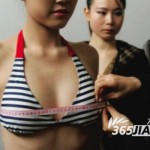
Durex Condom Ad Insinuates Barack Obama Is Much Larger Than Mitt Romney November 8
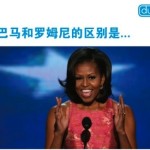
Reply to my Diaspora Fenqing Nationalist Critics
I knew this was going to happen. Was it George Bernard Shaw who said: "Never wrestle with pigs. You both get dirty and the pigs like it"? That is where I find myself now. In my previous post, I criticized Great Leap Famine denialists, knowing full well that this would likely spark an attack against me personally. And, lo and behold, like clockwork, it has. I will not belabor this exchange, for there is really no prospect of any sort of meaningful outcome when dealing with staunch ideologists incapable of anything but stark binary oppositions, and I will not link to the site (don't feed the trolls...), but I will make a couple of clarifying comments.
First, the question of precisely how many people died during the Great Leap Famine is not settled. It will likely never be, as I suggested in the original post. There is certainly room for serious intellectual investigation into the issue of how many people died. I do not believe that all such critical questioning of the death toll is motivated by denialism. But it is rather obvious that a particular subset of that criticism is denialist. This is difficult for ideologically- and politically-motivated people to grasp, because they think only in black and white terms. So let me be painfully clear: not all critiques are denialists, but all denialists are rooted in a political agenda that keeps them from maintaining an open and, ultimately, critical attitude. They are apologists.
Thus, I do not view Amartya Sen as a GLF denialist, as is implied by my critics. Sen is obviously a serious intellect. I am a bit amused, however, that he would be invoked in this manner, since he is famous for arguing that famines do not occur in democratic regimes. Although that argument has opened into a wide-ranging debate about the politics of famine, and there are ways in which Sen's analysis has run into problems (Zimbabwe, for example, turned out not to be as democratic as he first thought), his basic point is crucial to keep in mind when thinking of the Great Leap Famine: the causes of that terrible tragedy are rooted in the nature of the political regime, whether we call it "authoritarian" as Sen does or "totalitarian" as Yang Jisheng does. The PRC political system, dominated by the CCP, is chiefly responsible. I am happy to include Sen's perspective into the conversation.
Selective use of sources is characteristic of the denialists' approach. In their most recent invective they continue to focus on demographic estimates, focusing specifically on possible problems with the 1953 census, in an attempt to discredit some of the larger calculations of GLF deaths. On this narrow question, I accept the possibility that the 1953 census could be flawed, just as so many other statistical products of the Maoist era PRC are flawed. But debates among demographers do not settle the larger question of how many actually died. Especially when we have a growing body of archival documentation - not simply demographic estimates, but internal bureaucratic reports from the time of the starvation itself - to bolster our understanding. The denialists assiduously avoid these sources, obviously because they point inexorably to the worst sorts outcomes.
When will they deal directly with the work of Yang Jisheng and Zhou Xun? Until they do, they cannot be taken seriously.
The denialists also ask why I would make the comparison between the death toll of the GLF and the horrible effects of Japanese imperialism in China. It is precisely because I see the latter as terrible, and yet, the Mao-led CCP killed more Chinese people than even that scathing inhumanity. Serious scholars of the GLF cannot avoid that sad comparison. Yang Jisheng writes (Tombstone, p. 13): "The Great Famine even outstripped the ravages of World War II; the war caused 40 to 50 million deaths throughout Europe, Asia, and Africa over the course of seven or eight years, but the Great Famine's 36 million victims died within three or four years, with most deaths concentrated in a six-month period."
It is precisely because the value of every Chinese life - whether victims of Japanese imperialism or Maoist radicalism - is significant, that such comparisons must be made.
But denialists cannot stand this. They must defend Mao; they must resist the terrible truth in order to preserve the memory of the Chairman. And those of us who would question Mao's culpability, must be totally negated. Thus, they call me "morally degenerate". This is Cultural Revolution language. The language of ideological motivation, intended to inspire repression and violence and elimination. That is the preferred idiom of the denialist: threaten in order to silence.
It must be rather frustrating for them, because they are losing this battle. Yang Jisheng's book was first published in Hong Kong, in Chinese. It its banned still on the mainland, but it went through eight printings in two years. It circulates widely in the PRC, in spite of the ban, and has become "...a legendary book in China." Thus, Chinese people are gaining access to the truth that the denialists work to repress. And Yang shows us that Mao bore significant responsibility for the mass death:
















































































































